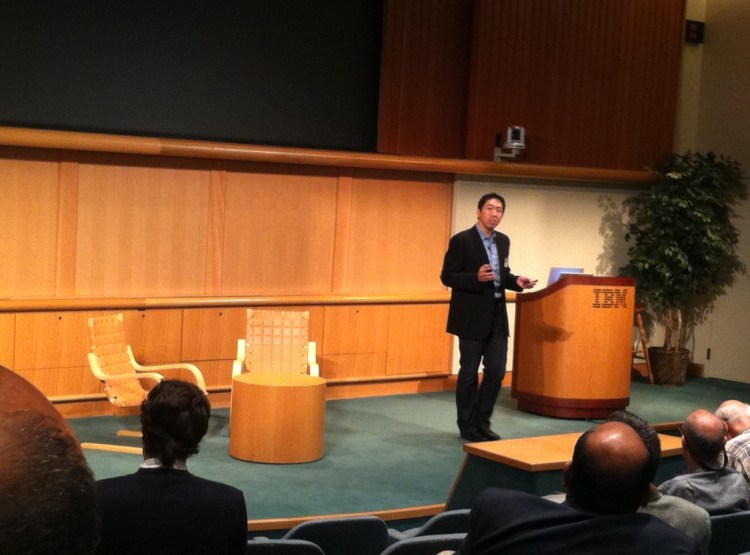SAN JOSE, Calif. — Unlike in-person education, massively open online courses, or MOOCs, have the advantage of generating data on performance and engagement, just like popular social networks. Engineers get data to scrutinize, and they can adjust operations to improve outcomes. That’s exactly what’s going on at Coursera.
Speaking at an IBM Research event on cognitive computing today, Coursera cofounder Andrew Ng gave a concrete example of not just A/B testing at work but what he called A/B/C/D/E/F/G testing to see what sort of contact gets the best results from the site’s more than 100,000 students.
“It turns out that if every week we send out an email that says, ‘Dear student — friendly reminder — next homework is due Saturday,'” the level of engagement typically falls, he said.
Better engagement, Ng said, came from this messaging: “Dear student — we noticed you logged in to watch five videos. Good job on that. Check mark,” Ng said. The same goes for recognizing and praising participation in discussion forum.
“It sounds natural in hindsight, but we didn’t have this insight ourselves,” said Ng, who, in addition to his work on Coursera, is the director of the Stanford Artificial Intelligence Laboratory.
Only after analysts compared results on course completion from various interactions was Coursera able to realize what was happening. A professor could accumulate similar anecdotal evidence, but he or she would be unlikely to observe trends at scale. And that’s what Coursera can do, because it reaches tens of thousands of students and collects data on what students click on, when they skip over content, and so on. A professor might be able to build up comparable insights over several years, not just one or two.
Editor’s note: Our upcoming DataBeat/Data Science Summit, Dec. 4-Dec. 5 in Redwood City, will focus on the most compelling opportunities for businesses in the area of big data analytics and data science. Register today!
An audience member asked Ng how IBM’s Watson learning and question-answering computer could improve Coursera. “I think it would be fascinating to see Watson technology provide a better tool for auto-grading of free text,” he said. Watson could also study the course material through transcripts and then offer more direct tutoring support for students, Ng said. Watson could also identify the most informative threads within Coursera’s discussion forums, he said.
But free online courses are still in their infancy, Ng said, and have plenty of room to improve.
“I hope within a couple of years, MOOCs will look very different than they do today,” he said. And data should help get from here to there.
Perhaps we’ll hear more about how data can improve education when Sebastian Thrun, cofounder and chief executive of Udacity, speaks at VentureBeat’s DataBeat/Data Science Summit next month.


